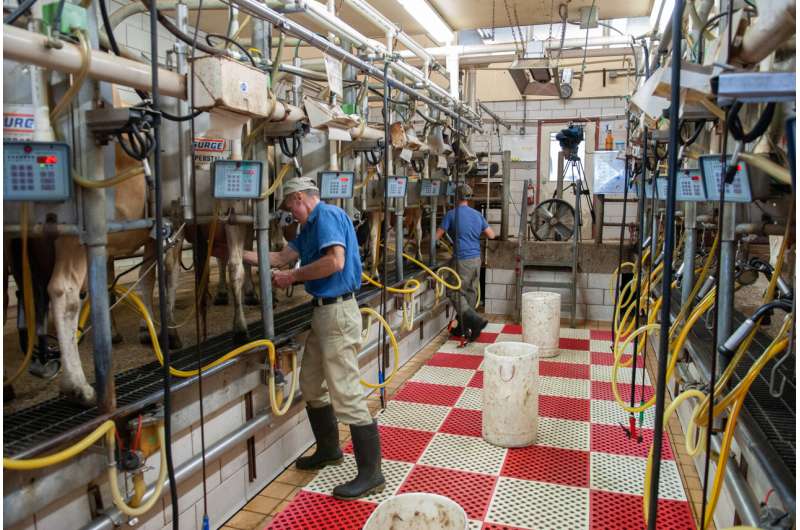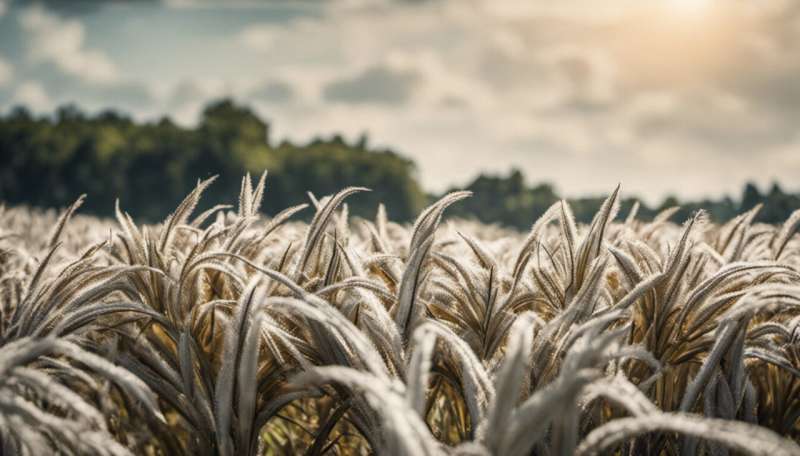Palm kernel product imported for use on dairy farms may actually be harmful to cows

Each year, New Zealand imports about 2 million tons of palm kernel expeller (PKE), a by-product of palm-oil processing in Indonesia and Malaysia, to feed dairy cows, at a cost of NZ$800 million.
But our research shows PKE contains concentrations of some elements that may be harmful to cows.
We analyzed the chemical composition of several batches of PKE imported into New Zealand over two years. We found it contained concentrations of iron, magnesium and phosphorus that exceeded safe levels for dairy cattle health. Some batches contained concentrations of aluminum, copper, sulfur and potassium within 90% of their safe limits.
These elements may have both positive and negative effects on the health of dairy cows and soils. But there is no monitoring and our research shows the chemical composition of different batches imported into New Zealand is highly variable.
Copper in PKE may be helpful in treating widespread deficiencies of this element in New Zealand’s farming systems. Similarly, magnesium in PKE may offset the need to supplement this element for lactating dairy cows.
PKE may be a source of fertilizing nutrients into soils. It contains high concentrations of phosphorus, which will improve pasture growth when deposited on the soil in animals’ manure.
However, the concentrations of iron, aluminum, potassium and sulfur in PKE may cause nutrient imbalances in dairy cows. The actual effects on dairy farms, soils and milk are yet unknown. Other evidence suggests these chemical elements, when eaten by cows, may end up in milk.
PKE in the New Zealand environment
Currently, environmental regulations require farmers to quantify every input to their farms in order to meet nutrient budgets to stay within freshwater quality standards. When the composition of PKE changes batch by batch, it becomes very difficult to quantify farm inputs and meet farm-nutrient budgets.
Fonterra and Synlait, two of New Zealand’s largest dairy companies, actively discourage the use of PKE because it can change milk composition, giving it a higher fat content.
However, it remains widely used due to feed shortages. Potentially, PKE use could be offset by reusing some of the more than 2 million tons of food and food-processing waste New Zealand produces annually.

Palm oil production
Even if PKE were proven to be beneficial to New Zealand agriculture, there is still the ethical question of whether New Zealand should be supporting an industry with unsustainable production patterns.
The production of palm oil has been linked to deforestation in tropical rainforests in Indonesia, as more and more land is needed to produce this increasingly common commodity used in everyday foods and personal-care products.
Even when PKE is certified by the Roundtable on Sustainable Palm Oil—a certification program for palm oil growers, suppliers and users—research has shown this palm oil is no different to any other in terms of social, environmental and economic outcomes for people and the environment.
In 2015 and 2019, Indonesia gained media attention for forest fires to clear land for palm oil production, resulting in air pollution in neighboring countries.
An audit by the Indonesian government in 2018 found 81% of palm oil plantations were breaching environmental regulations. Breaches included failing to obtain permits, not complying with sustainability standards and encroachment into surrounding protected forests.
New Zealand’s support of this industry is controversial, especially when there are potential alternatives.
Possible alternatives to PKE
New Zealand imports more PKE than the European Union. There are possible alternatives made in New Zealand that currently end up in landfill, including biowaste from the food and beverage sector. This waste includes leftover products from potato processing, wine making, brewing and other food-processing industries.
By importing PKE, New Zealand is forgoing the opportunity to use these locally produced waste materials as animal feeds and to avoid greenhouse gas emissions produced when they are sent to the landfill.
There is an opportunity here to repurpose food waste and the nutrients it contains for New Zealand’s primary sector. This is the subject of ongoing research at the University of Canterbury, Lincoln University, Manaaki Whenua Landcare Research and ESR.
This article is republished from The Conversation under a Creative Commons license. Read the original article.![]()
Citation:
Palm kernel product imported for use on dairy farms may actually be harmful to cows (2022, December 23)
retrieved 23 December 2022
from https://phys.org/news/2022-12-palm-kernel-product-imported-dairy.html
This document is subject to copyright. Apart from any fair dealing for the purpose of private study or research, no
part may be reproduced without the written permission. The content is provided for information purposes only.
For all the latest Science News Click Here
For the latest news and updates, follow us on Google News.

